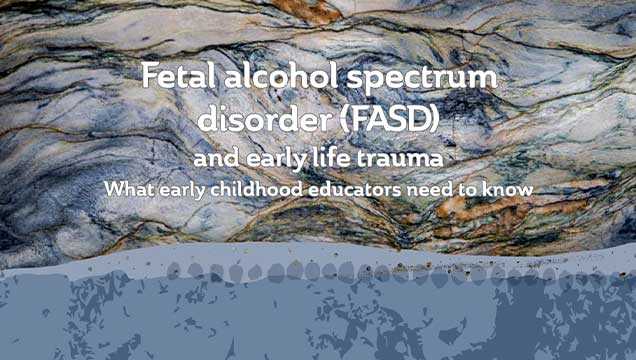The third edition of Fetal Alcohol Spectrum Disorder (FASD) and early life trauma: What early childhood educators need to know, published by the Marninwarntikura Women’s Resource Centre (MWRC), will continue to be a valuable tool in providing essential insights for early childhood educators working with children who have FASD and have also experienced early life trauma. It is written by two experienced educators, Sue Thomas and Jane Weston who bring a wealth of knowledge with extensive experience developing First Nations education initiatives.
FASD results from prenatal alcohol exposure (PAE) and can cause cognitive, behavioural, and physical challenges in children which will impact their learning, their performance at school and development of social and emotional skills. When combined with complex trauma, such as abuse or neglect, drug or alcohol use at home, or having a parent in jail, the effects can be even more profound, particularly impacting a child’s emotional and cognitive development. MWRC’s resource emphasises the need for educators to understand these challenges and apply both FASD-informed and trauma-informed teaching strategies.
“We need to acknowledge that children and their families in our communities are living with unique and complex needs, and that it is upon us to become informed and educated about the appropriate and respectful responses we can provide to those children,“ says Marninwarntikura Women’s Resource Centre CEO Emily Carter.
Key strategies for educators
The resource offers practical guidance for creating supportive classroom environments and encouraging education staff to establish clear routines and predictable structures to help children with FASD who may struggle at school with learning, socialising, organisational skills and transitions.
Strategies to support children with FASD include:
- simplifying instructions
- offering emotional support
- collaborating with families and other professionals to provide consistent care
- building trust through stable relationships is essential, as children affected by complex trauma often have difficulty forming secure attachments.
Approaches tailored to a child’s capacity and skills can help foster a learning environment in which children with FASD can flourish.
Culturally sensitive approaches
MWRC’s resource also emphasises the importance of cultural sensitivity, particularly when working with Indigenous communities. It highlights the impact of intergenerational trauma and stresses the need for educators to use culturally appropriate language, assessments and interventions to ensure that children from First Nations communities feel respected and understood in the classroom.
Marninwarntikura Women’s Resource Centre CEO Emily Carter says, “we can’t understand anything about FASD without understanding trauma. Many in the Fitzroy Valley drink so they don’t have to feel the overwhelming emotion triggered by personal histories and trauma. Instead of judging people for their actions, we must start asking what has happened to them. As soon as we move beyond the judgement and seek to respond with understanding, we can create more positive futures.”
A call to action
Aiming to equip educators with the tools needed to support children with FASD and complex trauma, the resource highlights the importance of early-intervention for children displaying challenges, in a trauma-informed and culturally responsive way. By fostering stability and understanding, educators can help children overcome obstacles and succeed in the classroom, ultimately improving their long-term outcomes and setting them up to thrive.
View or download Fetal Alcohol Spectrum Disorder (FASD) and early life trauma: What early childhood educators need to know.



